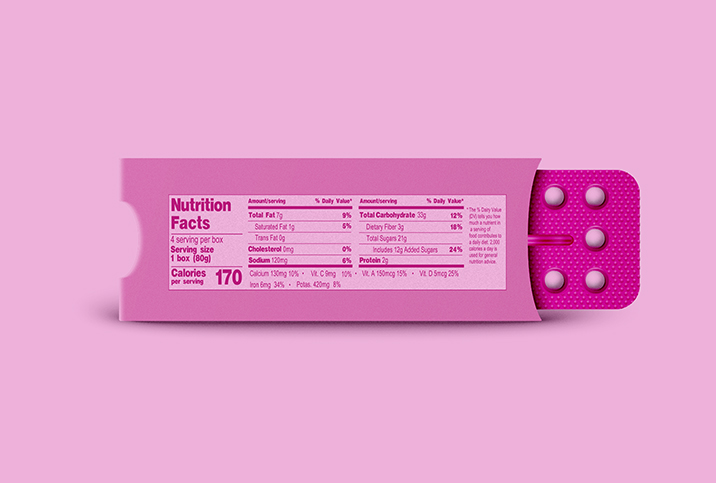Is Your Birth Control Pill Causing Nutritional Deficiencies?

If you're reading this, you're most likely taking an oral contraceptive. Around 25 percent of women ages 15 to 44 use the pill as their main method of birth control in the United States. The popularity of the pill isn't a mystery. Oral contraceptives are a highly effective way to prevent pregnancy. If taken correctly, the pill is 99.9 percent effective.
Beyond pregnancy prevention, some women also take the pill because of hormonal imbalances, medical conditions and to lessen their PMS symptoms. Whatever reason you take the pill, everyone should be aware there are both benefits and risks. While research is ongoing, a possible risk of the pill is nutritional deficiencies.
What does the research say?
Simply put, a nutrient deficiency occurs when your body isn't getting enough of a certain vitamin or mineral. Nutritional deficiencies can lead to a variety of health complications, such as bone disorders, skin problems, eye problems and mental disorders.
Badder Hina Afnan, a clinical dietician at Dow University of Health Sciences in Karachi, Sindh, Pakistan, noted that some research suggests a correlation between using the pill and developing a nutritional deficiency. One study published in 1980 indicated a connection between the birth control pill and folic acid, thiamin, ascorbic acid and zinc deficiencies—and recommended possible supplementation.
Modern studies have suggested similar findings. A 2013 study in The European Review for Medical and Pharmacological Sciences noted "the key nutrient depletions concern folic acid, vitamins B2, B6, B12, vitamin C and E and the minerals magnesium, selenium and zinc." The authors also said, however, that the women included in the study may suffer deficiencies due to inadequate diets or unhealthy lifestyles.
'It is difficult to draw definite conclusions because blood analyses are not always the most accurate or sensitive measure of changes in nutritional status.'
A Colorado State University fact sheet reviewed potential vitamin and mineral deficiencies associated with the pill and found that drawing conclusions was difficult due to the types of analysis being done. The fact sheet was authored by J. E. Anderson, a Colorado State University Extension foods and nutrition specialist and professor of food science and human nutrition.
"Most research has focused on the levels of these vitamins and minerals in the blood of women who take oral contraceptives and compared to women who don't," Anderson explained in the fact sheet. "It is difficult to draw definite conclusions because blood analyses are not always the most accurate or sensitive measure of changes in nutritional status."
While research on the topic is not conclusive, here's what researchers have uncovered about the connection between birth control and nutrient deficiencies so far.
B6
Vitamin B6 is important for cognitive and immune function. B6 deficiency symptoms include seizures, rashes and cognitive issues.
"Vitamin B6 is a hormone-regulating vitamin that helps the body make the feel-good neurotransmitter serotonin, which in turn helps regulate mood and may keep you from overeating," Afnan said. "Studies show that women on the pill metabolize B6 differently, potentially interfering with serotonin production."
While limited research suggested that oral contraceptives deplete B6, more studies need to be conducted.
Folic Acid
Folic acid is a B vitamin important in forming new cells. Some symptoms can include depression, cognitive impairment and a beefy red tongue.
A 2012 study suggested a link between oral contraceptive usage and folic acid deficiency and recommended adding folate to birth control pills. And, in fact, "the FDA recently approved an oral contraceptive containing folic acid," Afnan noted.
"In several cases, women taking oral contraceptives developed folic acid deficiency," Afnan said. She added, however, that many of these women had a low intake of folic acid or problems with intestinal absorption prior to taking birth control pills. This indicates more research is needed on the topic.
Afnan recommended women add folic acid through dietary choices. "Women on birth control pills should regularly eat good sources of folic acid," she said. "Good folate nutrition is especially important for women who become pregnant shortly after they stop taking oral contraceptives."
Riboflavin (B2)
Riboflavin is a B vitamin that builds up coenzymes that play major roles in the metabolism of fats, drugs and steroids; energy production; and cellular function, growth and development.
"If a woman has a riboflavin deficiency before she starts taking oral contraceptives, birth control pills will aggravate that condition," Afnan said. "Riboflavin deficiency caused by low intake is more common among lower-income women of child-bearing age who may not have access to good food sources, such as milk, meat and dark green leafy vegetables."
Afnan recommended women who take oral contraceptives should increase their riboflavin intake. "Good but inexpensive sources (of riboflavin) include dried milk and enriched grains and cereal products," she said.
B12
Vitamin B12 (cobalamin) plays an important role in DNA production, red blood cell formation, nerve function and more. Good dietary sources of B12 are found in dairy, fish and meat products.
As far as B12 deficiency, more research is needed on the link between B12 and the birth control pill. One 2012 study noted there was a correlation between decreased B12 levels and birth control use. However, the researchers noted the findings weren't clinically significant.
Zinc
Zinc is a nutrient important for immune and metabolic function. Weight loss, early balding, loss of appetite, depression and slow healing from wounds are all signs of zinc deficiency. According to the World Health Organization, nearly 31 percent of the population has zinc deficiency. (So even if you aren't on the pill, you might want to look at your zinc levels.)
A 2009 study suggested that using hormonal contraceptives can lower serum zinc levels within the first three months of use. A 2011 study in the European e-Journal of Clinical Nutrition and Metabolism also suggested zinc deficiency associated with oral contraceptives.
Vitamin C
Vitamin C is integral to your body's healing process and in the formation of blood vessels, cartilage, muscle and collagen. Vitamin C deficiency (also known as scurvy) is a condition generally associated with low socioeconomic status. However, vitamin C deficiency is possibly found in women taking hormonal birth control as well.
"Decreases in vitamin C in plasma and cellular components have been reported in women who take birth control pills," Afnan said. She stressed, however, how limited the data is on oral contraceptives and vitamin deficiencies.
She encouraged women on birth control to talk to their doctors about concerns. "I must say it's better to discuss with your doctor regarding medication to avoid any complication in (the) future," she said.
Eating away the (possible) deficiencies
While it might be tempting to take specific supplements to combat nutrient deficiencies, "it's always best to get the vitamins and minerals from food," said Swathi Varanasi, PharmD, an integrative health pharmacist and published author in Los Angeles, California.
Afnan recommended specific foods for women taking oral contraceptives to combat potential nutrient deficiencies:
- Bananas. The Harvard School of Public Health website sites bananas as a good source of B6 and folate. "Just one contains 40 percent of your daily value of B6," Afnan said.
- Greek yogurt. "Just one cup of Greek yogurt serves up almost half your daily dose of riboflavin, plus, yogurt is packed with bone-building calcium and digestion-boosting probiotics," Afnan said. Getting sufficient riboflavin may also prevent headaches, a common side effect of taking the pill.
- Leafy greens. According to Afnan, leafy Greens like kale, spinach, okra and broccoli are packed with folate.
Education and awareness
While current research is not conclusive, it's important that women on the pill understand both the potential side effects of oral contraceptives and dietary recommendations for their age and personal health status.
However, it isn't only patients who aren't aware of the potential for nutritional deficiencies. Debra Shapiro, M.D., board-certified OB-GYN and health coach in Burlingame, California, was surprised to learn there was a link between oral contraceptives and nutritional deficiencies. "How could I not have been taught this ever?" she asked. "I wonder if this is just another example of how nutritional education is not yet a major focus of medical education."
"After reviewing the recent literature, it seems prudent to recommend a multivitamin to women using oral contraceptives for a prolonged period of time," Shapiro said.
If you're taking an oral contraceptive, talk with your doctor to find out if you're at risk for nutritional deficiencies.


















